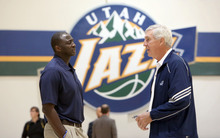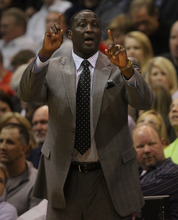This is an archived article that was published on sltrib.com in 2013, and information in the article may be outdated. It is provided only for personal research purposes and may not be reprinted.
It's been talked about before. It will be talked about during. It will be talked about after. How the Jazz define success and how Ty Corbin handles the team in this season of development, discovery and defeat will determine a whole lot about the coach's future here and about the Jazz's coming course.
"I'm not worried about it," Corbin said.
He should be.
Not to the point of freaking out over losses, constantly obsessing over the ramifications of losses. And maybe that's what he means. He won't nervously fret night after night. There will be too many numbers too often on the short side for that.
This is a Jazz anomaly, then: Forget about winning.
But we've all seen the way Corbin is reacting through the preseason. There have been times and places where he looked as though he were coaching in the playoffs — when the final count didn't even matter. But he knew the plays that added up to the outcome did — just as much as the plays in real games will mean something.
"I feel like I'm teaching more," he said. "And the guys are learning."
Class is class, and it's been in session for a while now. There is no preseason in the school year. Learning is learning, and in the case of the Jazz's 2013-14 academic calendar, the curriculum is … well, let's just call it advanced.
"We all have to pay attention," said Derrick Favors.
Corbin will be grading on a curve, and he'll be graded on a curve, too. This season isn't about wins or losses, and that's a fortunate thing for him.
All of this has been said before. I've said it a thousand times already. What hasn't really been said is that none of this is an excuse or a pass. Accountability is still in play.
Ever since he was elevated by the Jazz to head coach in February 2011, when Jerry Sloan decided one shocking night to ride off, Corbin has had built-in excuses for the Jazz not quite reaching loftier heights.
In 2010-11, it was Jerry leaving and the trade of Deron Williams.
In 2011-12, there was the lockout, when training camp was delayed and then abbreviated and that was tough, especially on the young players.
In 2012-13, there was a bunch of veterans with expiring contracts mixed with those youngsters, and it was difficult to deal with that. Corbin kept what could have been a splintered locker room together. That's what was said, anyway.
Now, the win total matters only within a greater context of the progress that Favors and Enes Kanter and Gordon Hayward and Trey Burke and Alec Burks and Rudy Gobert make. If they win a little but learn a lot, that's OK. It might even be preferable to winning — within a modest realm — without learning. With a rich draft on the horizon, matriculating to a high spot in the lottery will work fine.
Some people say losing is a distasteful route to winning. But those people aren't paying attention to the realities of the NBA. Without the kind of market that can attract top free agents, a club annually fighting for the eighth seed in the playoffs will never win a championship.
San Antonio and Oklahoma City are well-run organizations led by people who have made good personnel decisions. But they are nowhere special without drafting Kevin Durant and Tim Duncan. How did they get to draft those rare talents? By losing.
So Corbin's job this year — the way he will be measured — is to teach his players well, even as they lose. If they play defense and play hard and improve, that then will be enough, even though Corbin is not Dennis Lindsey's guy. Add the right high lottery pick out of an exceptional draft (Lindsey's responsibility) to the mix, and use financial flexibility to fill out the roster, and the Jazz's future can be bright, no matter how dark it gets right now.
GORDON MONSON hosts "The Big Show" with Spence Checketts weekdays from 3-7 p.m. on 97.5 FM/1280 and 960 AM The Zone. Twitter: @GordonMonson.





